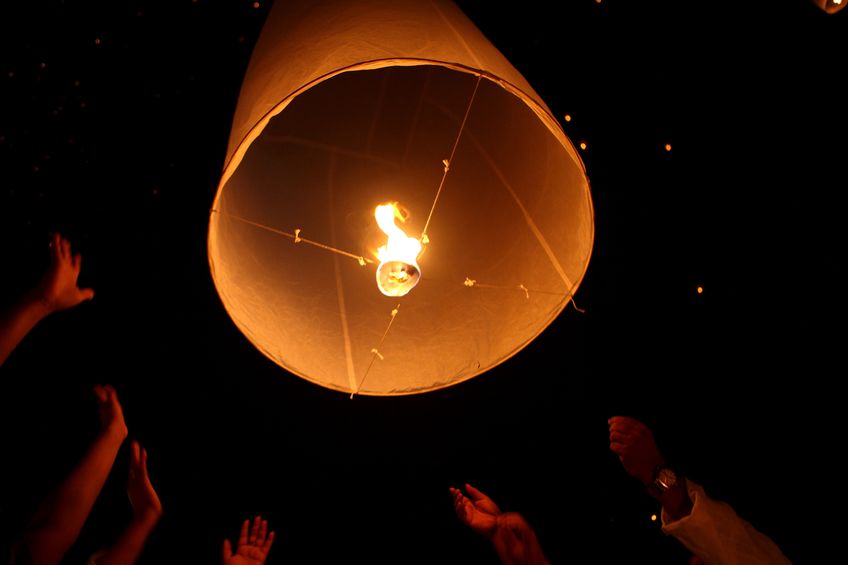
Farmers have highlighted significant concerns over proposed events to release hundreds of sky lanterns in aid of the NHS amid the coronavirus outbreak.
The campaign, which aims to occur every Sunday, would see the release of Union Jack sky lanterns from gardens and driveways of houses across the country.
The aim of the initiative is to raise money and support the NHS, whose doctors and nurses are working to overcome the Covid-19 crisis in the UK.
"As we are all advised to #StayAtHome and follow social distancing guidelines, but all together, we will be releasing Union Jack Sky Lanterns... until this unprecedented situation has been overcome," Night Sky Lanterns, the firm selling the products, said.
Thank you for your support ????
— Night Sky Lanterns ® (@NightSkyLantern) April 9, 2020
United together to enlighten the sky with Union-Jack lanternshttps://t.co/9zhiXFdyJL pic.twitter.com/moskGrIt1q
While farmers have backed numerous events to raise money for the NHS, Night Sky Lanterns has been criticised for promoting a well-known menace for many in the countryside.
Drifting for miles, the objects are seen as a concern for farmers who frequently report sheep, cattle and horses being injured or even dying from eating the wire metal frames of the lanterns.
Not only that, farming industry groups also say sky lanterns are also a serious source of litter in the countryside.
Club Hectare co-founder and Yorkshire arable farmer Jono Dixon said the sky lantern proposal is a 'totally senseless' idea.
"I wonder if you've stopped to think about the dangers to property and to livestock," he said in response to Night Sky Lanterns' tweet.
"Fields full of lambs and calves, they're inquisitive and could swallow any remnants from these darn lanterns."
Arable farmer Andrew Ward called for an outright ban on sky lanterns.
What a ridiculous and dangerous way to support the NHS. Livestock, pets & the environment, all damaged. Not to mention the increased risk of causing fires at a time when the emergency services are at their limit. These need banning: NOW.@EdwardLeighMP @karlmccartney https://t.co/uCkATyoFAu
— Andrew Ward ?????? ???? (@wheat_daddy) April 14, 2020
Hundreds of other social media users responded to the firm's post on Twitter, calling it 'horrendous' and 'dangerous'.
We would strongly discourage anyone from lighting a sky latern at this time. Sky lanterns could lead to a complex large-scale incident and take up valuable resources. There are a number of non fire risk shows of support people can do instead. The best is #StayatHome
— London Fire Brigade (@LondonFire) April 14, 2020
Donate money to the NHS, but DON'T buy or light one of these skylanterns. They are so dangerous for wildlife and a fire risk.
— iain green (@naturebygreen) April 13, 2020
These have the potential to start fires in fields and property at a time when Fire and Rescue Service resources are concentrating on the response to the C19 crisis, please find another way to show your appreciation https://t.co/nb7VgvuB9w
— Roy Wilsher (@NFCCChair) April 14, 2020
Responding, Night Sky Lanterns said while it recognises that sky lanterns have caused 'inconveniences' to farmers, it believed the concerns are associated with 'poor quality sky lanterns which are not equipped with the latest innovative components'.
"We strongly advise our customers and those who intend to place an order to strictly follow guidelines and safety instruction. In particular, only use sky lanterns in appropriate weather conditions," the firm said.
But the National Fire Chiefs Council (NFCC) said the campaign was 'misguided' as emergency services are 'under unprecedented pressure' due to Covid-19.
Chairman Roy Wilsher said: “While I fully understand people wanting to show their support to the NHS, I would encourage people to find a different way to do this.
“NFCC does not advocate the use of sky lanterns and we do not believe they should be used under any circumstances.
“All emergency services are currently under unprecedented pressure due to Covid-19, and I am concerned this type of activity could not only put additional pressure on the fire service, but further strain on the NHS.”
